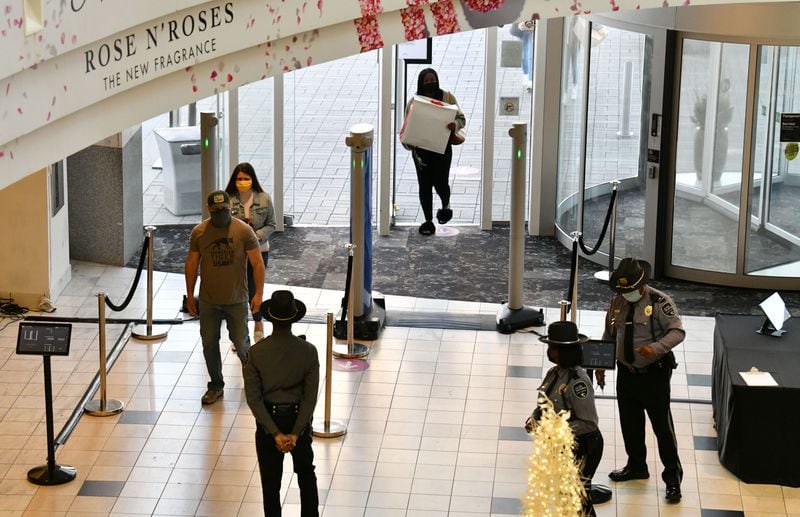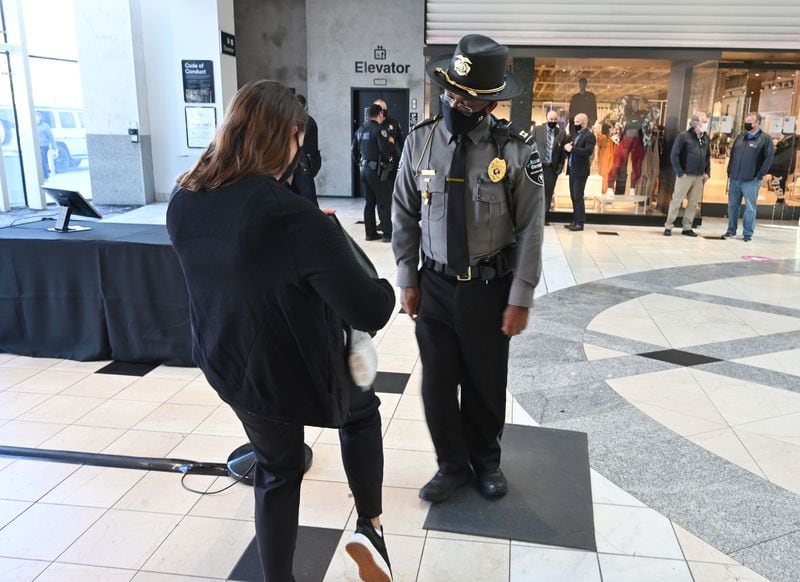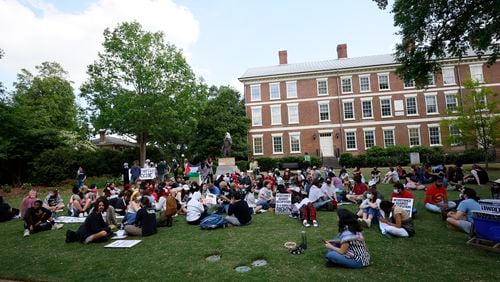June Walton walked to the main entry of Lenox Square with a handgun Tuesday morning, but he didn’t enter right away.
After seeing the armed officers and the new weapons detection gateways installed Monday, he returned to his car and dropped off the firearm before doing his shopping.
“There’s a big sign that says no weapons,” he said later. “Obviously, the presence right there, you can see you’re not getting in.”
That is exactly the reaction the Lenox management was hoping for when it increased security to counter a number of violent crimes in and around the mall. The violence reached horrific proportions last week with the shooting near neighboring Phipps Plaza that resulted in the death Saturday of Kennedy Maxie, a 7-year-old girl.
Lenox already had more than 200 security cameras, describing itself as “one of the most surveilled environments in Atlanta.” It also has about two dozen security enforcers on hand at any given moment, many of them off-duty Atlanta police officers.
Credit: HYOSUB SHIN / AJC
Credit: HYOSUB SHIN / AJC
The mall is trying to augment this without seeming too obtrusive. The new weapons detectors, monitored by armed officers and private guards, are located only at the main entrance so far as Lenox tests the technology. The developer named its new security product “Express” because it is meant to scan as many as 3,600 people per hour. Security only gets involved when the system detects a threatening object.
The system was created by a Boston company whose founders were nearby when bombers struck the city’s famous marathon in 2013. Evolv Technology says it harnesses radio waves, magnetic fields and artificial intelligence to detect guns, as well as knives and shrapnel in bombs, without the nuisance of magnetic wands or the intrusion of pat-downs.
It is legal to carry a firearm in Georgia, but property owners can dictate their own rules. The delicate task of educating shoppers about that distinction falls to the employees of Lenox manager Robin Suggs. “Many people have the belief that they can carry a weapon anywhere, and that’s certainly not the case,” she said.
The doorway scanner is a reaction to an “unprecedented” and “entirely unacceptable” crime wave that is “plaguing” Atlanta, she said.
Lenox isn’t the only venue with obvious security. An armed sheriff’s deputy was stationed outside an entry to Phipps Tuesday. At Atlantic Station, closer to the city center and the site of a recent fight involving hundreds of teens, management has brought in more off-duty police officers, according to a spokeswoman.
The Atlanta area’s spike in mall violence ― police in Dunwoody were investigating a possible fight and armed robbery at the Perimeter Mall Tuesday evening — comes as the pandemic suppresses the number of shoppers. For some mall managers, COVID-19 is just as big a concern. “The main thing is keeping people safe, having all of our attendants in masks,” said Christopher McCoy, the senior general manager of the Cumberland Mall, near the intersection of interstates 285 and 75. He said there hasn’t been a spike in crime there since a shooting a year ago.
At Lenox, Suggs is testing the Evolv detection system and that of a competitor at another entryway. She may eventually secure all the entries to Lenox if the crime spree continues.
“It’s unfortunate it’s what’s needed right now,” she said.
Credit: HYOSUB SHIN / AJC
Credit: HYOSUB SHIN / AJC
Evolv CEO Peter George said his new system is already deployed at numerous high-profile locations, including the Georgia Aquarium and the National Center for Civil and Human Rights in Atlanta and the Metropolitan Museum of Art, the Lincoln Center for the Performing Arts and the Museum of Natural History in New York.
He said the Boston bombing was a “catalyst” for the firm‘s founders to develop a system that could scan masses of people without pinch points in lines. His company offers the service on a subscription basis, and right now Lenox is just trying out the basic model. No facial recognition, no thermal imaging to detect fevers. He’d like to expand the relationship and use the company’s artificial intelligence processing with the data captured by the mall’s cameras.
“At some point, if they choose to keep us there — and we hope they do — we’ll be able to integrate into their existing infrastructure, extend the perimeter to different areas into the network,” he said, “so beyond the doorway out into the parking lot and into the mall.”
The screening didn’t bother Walton, the shopper with the handgun. He said he owns a security company and always carries one. He also said he was reluctant to enter the mall until he saw the security at the door. He lives in Los Angeles and said the violence around Lenox is well-known in his security circles there.
Another shopper, Audwin Cash of Brookhaven, dashed into the mall with his 12-year-old son to get the boy’s iPad pencil replaced at the Apple store where a man was shot during a fight last month. The extra scrutiny was “seamless and fast” but also “a little weird,” he said.
Lily Lee, an Atlanta mom toting a toddler, said the screening wasn’t as “intense” as at an airport and made her feel safer. She said it didn’t feel invasive even though the imaging system flagged her backpack for inspection.
She said it contained a couple of eyeglass cases ― and diapers for her son.








